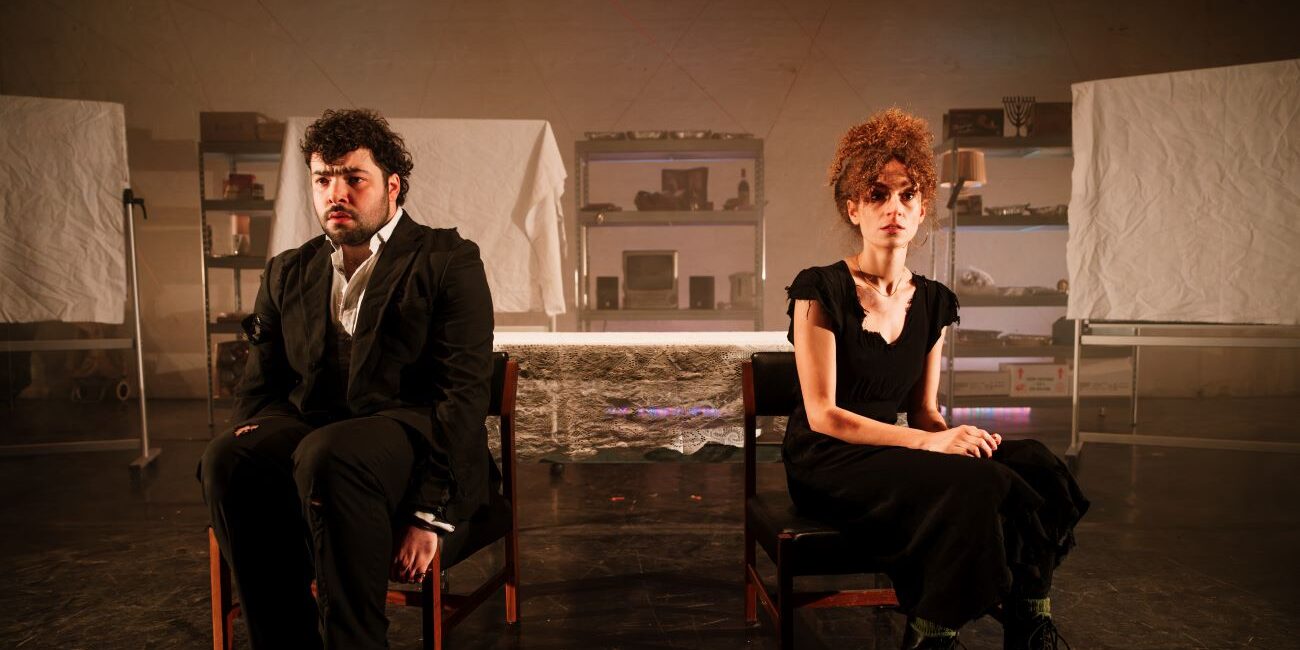Theatre is limited, we’re told, in a way that film is not. What if you wanted to write a play with adrenaline-inducing car chases around the North Circular? Or where a nonagenarian gangster descends in a helicopter to save a pair of clueless twins? This is precisely what Nick Cassenbaum has done in his heady revenge romp, Revenge: After the Levoyah, proving that the four corners of the sky are the only limits for what is possible on the stage as in life.
The play follows the story of Dan and Lauren, two apathetic twins in their late twenties from Essex, who are swept up in ex-gangster Malcolm Spivack’s plot to kidnap Jeremy Corbyn. It’s 2019 and the Labour politician’s alleged anti-Semitism has left their family and wider community feeling unsafe, othered, and with a strong desire to bring him to reckoning. After centuries of heinous prejudice and persecution against the diasporic Jewish community, this darkly comic tale reverses the witch-hunt.
With stellar direction from Emma Jude Harris, the farcical heist narrative throttles forward in compulsively watchable episodes, moving from the twins’ grandfather’s levoyah (funeral) to domestic scenes showing familiar intergenerational discord; and as the story takes a Guy Ritchie turn, we observe a motley cast of Jews – among others, a crippled holocaust victim, a slick city geezer, a self-interested rabbi – plotting on blackboards in a warehouse full of catnip in Canning Town.
It is a testament to Cassenbaum’s impeccably structured writing that the play delivers events that could easily fill a two-hour film in a satisfying swift hour. He’s also a master of dialogue. While not every reference to Yiddish folklore or culture is readily accessible, this in no way hampers the fun to be had. It invigorates the play by drawing us more intimately into the British Jewish experience through the unique rhythms and snappy poetry of authentic spoken language.
Bringing the colourful characters of Revenge: After the Levoyah to life through deft modulations in voice and movement are expert performers Dylan Corbett-Bader and Gemma Barnett, whose continual shapeshifting mesmerises. As the gruff ex-gangster Malcolm, Corbett-Bader develops an arrogant swagger and growls radicalising invective, while as Dan, he’s a useless Nintendo Switch addict, twitchy at the mention of political involvement and as wet as a pickle in brine. Barnett plays Lauren as cerebral and self-assured, outmanoeuvring men in poker games and taking action when it counts (it’s not for nothing that Malcolm comments on her ‘special’ potential). Just as memorable is her performance as Moishy, the Belsen survivor, played with a wonky gait and a voice full of croaks belying quick-witted chicanery.
Alys Whitehead’s quietly evocative set design intentionally leaves much to the imagination, thus turning the play’s audience into co-conspirators. On the smoky stage, tables and blackboards are shrouded mysteriously (and funereally) in white cloths. Behind them are a set of warehouse factory shelves, stacked with items that emblematise the play’s oddball world, from jars of pickles, a TV and a golf club to, naturally, catnip. The implication is that we’ll have few things to orientate ourselves amid all these literal and ideological smokescreens.
Where Revenge: After the Levoyah really impresses, though, is in the complexity of its thinking. What might be a satiric gangster thriller is also a serious interrogation of youthful apathy and political ignorance, and its opposite, mindless collective hysteria. Cassenbaum asks how you can have convictions – or be a rebel with a cause – when the facts are continually being distorted. I left the play in no doubt that The Yard – this precociously intelligent, naughty child of a theatre – is producing the shows that will define this decade.
Revenge: After the Levoyah
Comedy
By Nick Cassenbaum
Director: Emma Jude Harris
Photo credits: Alex Brenner
Cast includes: Gemma Barnett and Dylan Corbett-Bader
Until: Saturday 25th January 2025
Running Time: 1 hour

